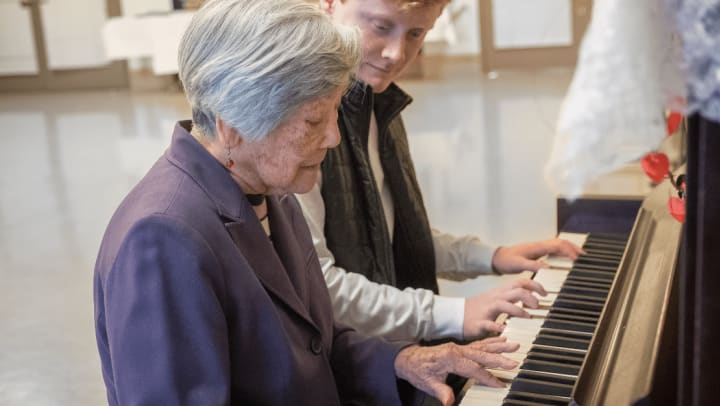Music has the remarkable ability to bring dementia patients back to themselves. South Tulsa, OK, memory care communities now make this powerful therapy a key part of their care approach. These specialized centers create environments that support their residents' well-being through innovative methods like music therapy. For families seeking quality dementia care in South Tulsa, OK, music offers a powerful bridge to reconnect with loved ones experiencing cognitive decline. When carefully selected, meaningful songs can help patients access emotional memories that appear to be lost, creating moments of connection that transcend the limitations of memory loss. These musical interactions often reveal surprising moments of clarity and recognition, providing comfort to both patients and their families during this journey of memory care.
Why Music Stirs Memory: A Look Inside the Brain
The connection between music and memory is nowhere near a coincidence—it's deeply rooted in our brain's wiring. Scientists have found that musical memory stays partially intact in patients with Alzheimer's disease, even when other memory systems show the most important decline.
Inside the musical brain, scientists have identified core regions that explain this phenomenon. Through functional MRI studies, researchers found that familiar music activates the caudal anterior cingulate cortex and ventral pre-supplementary motor area—regions that show little to no cortical atrophy or hypometabolism in Alzheimer's disease. These same areas play a role in music-evoked emotions and create a powerful combination that preserves musical connections. Music activates multiple brain networks at once, including:
-
Sensory-motor processing areas that respond to rhythm and beat
-
Emotion-processing regions like the amygdala and limbic system
-
Memory centers, including the hippocampus, which help store autobiographical memories
-
Frontal regions involved in attention and cognitive processing
This widespread brain activation explains why music therapy shows promise for memory care in Tulsa residents who struggle with cognitive decline. On top of that, it becomes especially effective because emotional memories are easier to recall than those without an emotional component.
The Best Music for Dementia Patients by Era
The secret to awakening memories lies in finding the right melody that appeals most to dementia patients. Music therapists make use of information about the person's youth to pick the right songs. This method builds on what neuroscientists call the "reminiscence bump." Memories from our formative years stay more available even as cognitive decline moves forward. To name just one example, see these genres for people born in the 1930s-40s:
-
Big band and swing music (Glenn Miller, Benny Goodman)
-
Early jazz standards (Ella Fitzgerald, Louis Armstrong)
-
Classic crooners (Frank Sinatra, Bing Crosby)
People who grew up in the 1950s-60s often connect with:
-
Early rock and roll (Elvis Presley, Chuck Berry)
-
Folk music (Peter, Paul & Mary, Woody Guthrie)
-
Motown classics (The Supremes, The Temptations)
These choices work well for patients whose youth was in the 1970s-80s:
-
Classic rock (Eagles, Fleetwood Mac)
-
Disco hits (Bee Gees, Donna Summer)
-
Early pop ballads (Carpenters, Billy Joel)
Practical Tips for Caregivers Using Music Therapy
Music therapy at home needs careful planning to work well. You can turn everyday care routines into special moments of connection with your loved one who has dementia. Your listening space setup makes a big difference. A quiet, cozy area without background noise works best for these sessions. Both headphones and speakers work equally well, though headphones help people who get distracted easily. Wireless Bluetooth headphones are safer because there's no risk of wire entanglement.
Songs that mean something special to the person work better than just calming music.
Watch how your loved one responds to the music. Look for these signs:
-
Changes in their face, movement or voice
-
Different breathing patterns or muscle tension
-
Emotional reactions like tears, smiles or laughter
-
More talking or memories coming back
These reactions show which songs help the most. You can then adjust the playlist and remove any songs that cause distress.
Music therapy stands as a powerful tool in memory care, preserving connections when other cognitive functions fade. The remarkable resilience of musical memories creates unique opportunities to reach loved ones with dementia, often restoring moments of identity and joy that other interventions cannot achieve. This neurological phenomenon offers hope to families navigating dementia challenges. When familiar melodies activate preserved brain pathways and emotional centers, they can:
-
Significantly reduce agitation and anxiety
-
Improve mood and emotional well-being
-
Create meaningful moments of connection
-
Trigger personal memories and associations
Whether implemented at home or through professional services, music therapy offers an accessible and effective approach to enhancing quality of life. Experience how the right songs can build bridges between past and present, revealing that the essence of your loved one remains even as memories fade. Contact us at (918) 940-1800 to explore our specialized memory care community, Iris Memory Care of Tulsa.
FAQs
Q1. How does music therapy benefit individuals with dementia?
Music therapy can improve cognitive skills, reduce anxiety, enhance communication abilities and boost mood in individuals with dementia. It can also help decrease the need for antipsychotic medications and provide emotional and cognitive benefits that support overall well-being.
Q2. How should caregivers implement music therapy at home?
Caregivers should create a quiet, comfortable listening environment, use personally meaningful songs, limit sessions to 50 minutes or less and control volume to 65dB or lower. It's important to observe the loved one's responses and adjust the approach accordingly. Family involvement and participation can significantly enhance the benefits.
Q3. Can music therapy help with communication in Alzheimer's patients?
Yes, music therapy can provide a non-verbal avenue for communication, allowing individuals with Alzheimer's to express themselves through singing, rhythm or movement.


